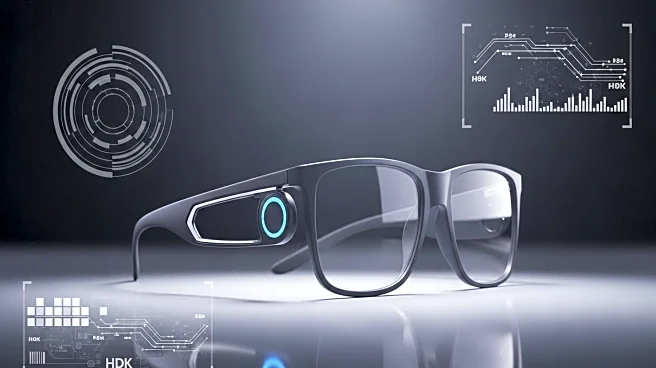What's Happening?
Inmo has announced the launch of its Air 3 smart glasses, which feature a touch-sensitive ring designed to improve user interaction with augmented reality (AR) technology. The Air 3 glasses, unveiled at IFA 2025, aim to address common issues with AR glasses, particularly the user interface. The smart ring functions as a button, touchpad, and mouse, allowing users to control virtual objects displayed on the glasses. The Air 3 is equipped with a micro OLED display from Sony, offering full-color 1080p resolution and up to 600 nits of brightness. The glasses run on Android 14 and include a built-in Google Play store, enabling users to download various apps. Powered by a Qualcomm Snapdragon XR processor, the Air 3 includes 8GB of RAM and 128GB of storage, supporting up to three independent virtual screens. Additional features include a 16-megapixel ultrawide camera and an array of microphones and speakers for voice assistant use and audio playback.
Why It's Important?
The introduction of Inmo's Air 3 smart glasses represents a significant advancement in AR technology, particularly in user interface design. By incorporating a touch-sensitive ring, Inmo addresses a key challenge in AR glasses, potentially enhancing user experience and interaction. This development could influence the broader AR market, encouraging competitors to innovate in user interface solutions. The Air 3's high-resolution display and app compatibility may attract tech enthusiasts and early adopters, potentially expanding the consumer base for AR devices. The integration of advanced processing power and storage capabilities positions the Air 3 as a competitive option in the smart glasses market, which could impact sales and market dynamics.
What's Next?
Inmo's Kickstarter campaign for the Air 3 smart glasses is set to launch on September 15, with the glasses priced at $899. The campaign will likely gauge consumer interest and demand, influencing production and distribution strategies. As the AR market evolves, competitors may respond with similar innovations or enhancements to their own products. The success of the Air 3 could lead to further developments in AR technology, potentially driving advancements in user interface design and application integration. Stakeholders, including tech companies and developers, may explore partnerships or collaborations to leverage the Air 3's capabilities and expand the AR ecosystem.
Beyond the Headlines
The launch of the Air 3 smart glasses raises questions about the future of wearable technology and its integration into daily life. Ethical considerations regarding privacy and data security may arise, given the device's camera and voice assistant features. Additionally, the cultural impact of AR technology on social interactions and communication could be significant, as users increasingly engage with virtual environments. Long-term shifts in consumer behavior and technology adoption may be influenced by the success and functionality of devices like the Air 3.








